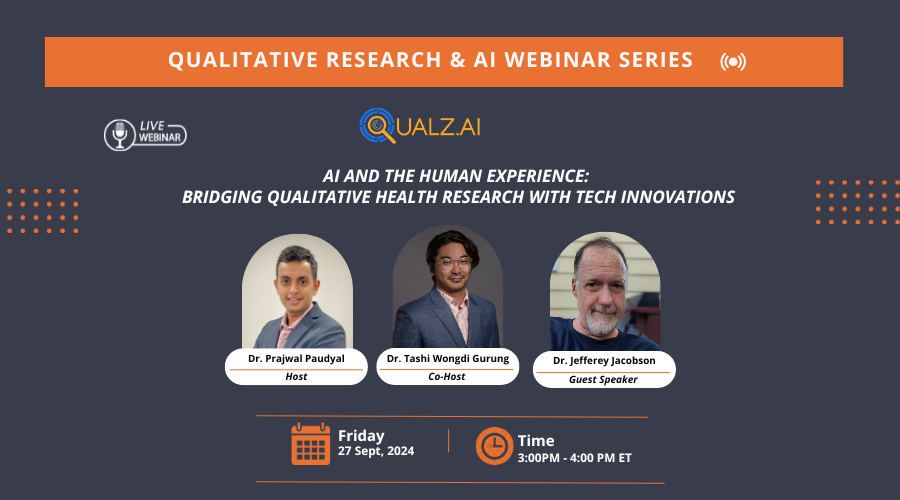We recently launched our ‘Qualitative Research & AI Webinar’ series, focussing on the intersection of AI and Qualitative Health Research Methodologies.
Featuring:
- Host: Dr. Prajwal Paudyal, CEO & Founder, Qualz.ai, AI Expert
- Co-Host: Dr. Tashi Wongdi Gurung, Qualitative Research and Anthropology Expert
- Guest Speaker: Dr. Jacobson C. Jeffrey, Professor and Anthropologist at the University of Cincinnati
5 Key Takeaways from this Webinar:
1. AI’s Role and Impact in Qualitative Research
AI’s potential to transform qualitative research is significant, especially in handling extensive data sets and automating initial research phases like literature reviews.
Dr. Jacobson shared insights on how large language models (LLMs) can help analyze large interview datasets, offering substantial time savings. However, he emphasized the need for human oversight to navigate the ethical, political, and practical dimensions that AI still struggles to grasp.
Likewise, Dr. Gurung added that AI performs best in structured settings, such as semi-structured interviews, where it can effectively manage predefined questions. He pointed out that the use of AI in ethnographic data collection is still premature. He also shared his experience using Qualz.ai, appreciating the platform’s approach to data—open coding, sorting, categorization, and theme generation—that goes beyond mere summarization.
Dr. Paudyal echoed these sentiments, highlighting that while AI tools, such as ChatGPT, can act as robust general assistants, they are yet to fully capture the complex nuances of human behavior without human input.
2. AI’s Role in Ethnographic Data Analysis
The discussion also touched on the transformative impact AI could have on ethnographic data analysis, where its capability to manage multimodal data could enrich research outputs.
Dr. Jacobson shared insights from his experience teaching medical anthropology, stressing the importance of clarity in research questions and the human skill of listening actively without imposing preconceived structures.
Dr. Paudyal expanded on these thoughts by discussing the contextual boundaries of a study and AI’s limitations in capturing the full spectrum of human experience underscoring the challenges of using it to replace the depth achieved by human researchers.
Meanwhile, Dr. Gurung focused on the relational aspect of interviews, where he raised a critical point about the potential of AI in making interviewees feel less judged, which could be beneficial in eliciting honest responses.
3. Ethical Considerations in AI-enhanced Qualitative Research
One of the most thought-provoking parts of the webinar was the discussion about ethics and privacy in AI-driven qualitative research.
Dr. Jacobson emphasized the importance of understanding AI technology to alleviate fears and misperceptions. He suggested that thorough education about how data is used and controlled can make AI tools feel safer and more acceptable to the public.
Similarly, Dr. Gurung pointed out that many people lack a deep understanding of how AI works. He emphasized collaboration between researchers and technologists to enhance the understanding and responsible use of AI.
Meanwhile, Dr. Paudyal contributed by discussing practical measures to protect data privacy when using AI for research, like turning off data retention features to prevent unintended data collection and usage in future model training. He also mentioned that on platforms like Qualz.ai, researchers’ data is rigorously protected and not used for model training, showcasing a commitment to data security and trust.
4. Navigating AI Challenges in Understanding Cultural Nuances
AI’s limitations in decoding complex cultural nuances were also discussed in this webinar.
Dr. Jacobson highlighted the need for human intervention to preserve the integrity of nuanced translations and interpretations.
While Dr. Gurung discussed although AI translation platforms are becoming more efficient, the collaboration between AI and human translators is crucial.
Dr. Paudyal agreed to it, discussing the scale of the research and the logistical challenges it presents. He acknowledged that while AI can enhance efficiency, it cannot fully replace the need for bilingual speakers and human checks, especially in large-scale studies involving thousands of interviews.
5. Addressing AI Bias in Qualitative Research
Dr. Jacobson highlighted the role of socio-economic and socio-cultural splits in influencing the data that AI systems are trained on. He raised concerns about the normalization of certain forms of language that are predominant online, potentially sidelining dialects less represented on the internet. This could introduce bias, underlining the necessity for ongoing research and vigilance to assess and address these biases.
Dr. Gurung acknowledged that bias is a natural human trait and suggested that it’s inevitable in AI as well. He advocated for the continuous application of AI on large and diverse datasets as a way to identify and reduce these biases.
Dr. Paudyal called for the use of specialized AI- tailored for specific tasks, and rigorous testing to mitigate biases.
Thanks to everyone who joined our first session! Let’s keep the conversation going as we explore how AI can further enhance qualitative research in future sessions! We appreciate your participation and look forward to seeing you in our next session!
Did you miss the webinar? Watch the recording here!
Are you also interested in speaking at our webinar? Apply here!
Would you also like to experience the power of AI in qualitative research?
Schedule a demo with Qualz.ai to see how we can streamline your research process faster and with more actionable insights!
